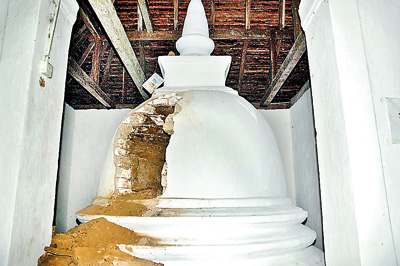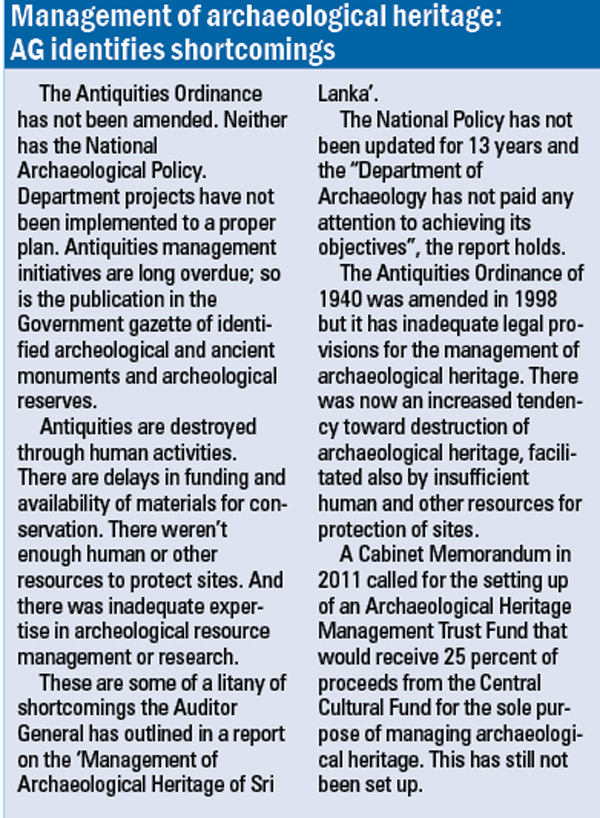News
Treasure hunters have a field day as law remains antiquated
“Treasure hunting” — the digging up of archaeological sites in search of historical artefacts which can then be hawked locally and internationally for a price — continues to be rampant in Sri Lanka and is aided by a lack of political will to put an end to it, officials said this week.

107 cases of excavations for treasure or damage to archaeological sites reported so far for this year
“He told me it was not a matter of importance, before throwing my papers onto the desk in front of him,” said Prof Senarath Dissanayake, Director General of Archaeology, describing a meeting he had with a former minister to obtain approval to gazette 2,500 historical sites as protected monuments. He did not wish to name the former minister.
The Archaeology Department was also severely constrained by insufficient resources. “We have only two constables in our police force,” Prof Dissanayake sighed. “We are understaffed and repeated requests to fill positions were not answered. We were weakened.”
Military resources and funds once deployed to protect Sri Lanka’s heritage were also stripped away, leaving the sector in shambles. This has led to treasure hunters, as they are popularly called, freely exploiting national assets even during a raging pandemic.
This year alone, there have already been 107 cases of excavations for treasure or damage to archaeological sites, the police media unit said. Since 2018, there has been an average of 325 cases a year.
“These excavations are often organised by gang members who fund equipment such as backhoes,” said T.M.C. Bandara, Exploration Officer at the Archaeology Department’s Special Unit for Prevention of Destruction and Theft of Antiquities.
Last month, four suspects were arrested in Hali-Ela in the Badulla district. They claimed they had obtained permission from the authorities to excavate their private lands in search of hidden treasure.
“The suspects are being held without bail. If they plead guilty they will be imposed a fine ranging between Rs 50,000 and 250,000 and released,” said A.M.P.K. Chandrasekara, Officer-in-Charge of Hali-Ela police. The case will be taken up before the Badulla Magistrate Court. Offenders rarely face jail terms.
“There is a desperate need for revision of legislation regarding archaeological sites and artefacts,” said Anura Manatunga, Senior Professor of Archaeology at the Kelaniya University and Director of its Centre for Heritage Studies. “The Antiquities Ordinance was last amended in 1998 and the fines are too meagre. This is the primary reason why the number of re-offenders is increasing.”
Artefacts hold untapped potential to reap huge returns for the tourism industry, aside for their inherent value which society fails to recognise, Prof Manatunga said.
No expert quoted in this article could say how artefacts are smuggled out or estimate how much they are worth. “Uncountable,” declared a senior official of the Sri Lanka Customs’ Biodiversity Unit, requesting anonymity.
Artefacts confiscated by the Customs are stored in the Customs Department headquarters in Colombo 11. The Sunday Times was not granted access despite repeated requests.
“Most items are confiscated from tourists who are unaware they have bought artefacts illegally,” said Priyanthi Wijenayake, Superintendent of the Customs’ Biodiversity Unit. It is not illegal to sell artefacts, but searching for and exporting them are, she added.
Antique shops are not required to register with the Archaeology Department. Therefore, differentiating which goods are authentic or illegally procured is difficult. “If there was some system to keep an eye on the trade, there would be opportunity to prevent illegal artefacts leaving the country,” said Prof Manatunga.
The Customs Department’s physical examination method searching for illegal artefacts at the borders is efficient, Ms Wijenayake insisted.
But Samantha Gunasekera, a former Deputy Director of Customs, said checks were done randomly without modern equipment.
“They send the pictures of suspicious items to the unit only after the passenger has left the country with the artefact,” he claimed. There are no special protocols or security at ports to mitigate the problem. And as the Biodiversity Division has a system whereby employees are rotated every two years, none of them can specialise.
The identification of artefacts “cannot be done by a machine”, Mr Gunasekara asserted. The paucity of trained professionals in this field is, therefore, a lacuna that needs immediate addressing.
The Customs Department store is reportedly piled with artefacts and “running out of space”, said Ms Wijenayake: “We donate what we can to the museums but it’s a big problem for us.”
Mr Gunasekara, who once headed the same unit, said he had established a database for logging artefacts. Space shouldn’t be a challenge provided the database was managed properly.
Public ignorance is the heart of these crimes, said Prof Manatunga. Children are not taught the value of heritage nor is society interested in the fate of the precious artefacts they let slip through their fingers for others to profit from.
“One such example is our statue of the Goddess Tara, which is displayed in the British Museum,” he said. “It could have been a huge asset to our tourism.”
Prof Dissanayake is now hopeful 2020 will be a good year for archaeology. President Gotabaya Rajapaksa has arranged a meeting to gather information from professionals and religious stakeholders to amend the Antiquities Ordinance. And the Department has plans to increase public awareness through workshops and a project which gives responsibility to schools to maintain gazetted sites.


